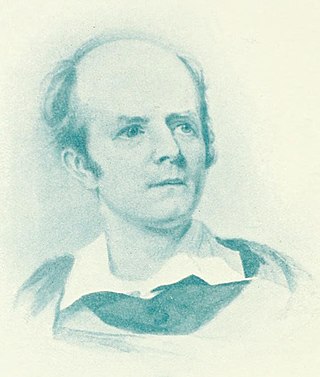
Robert Southey was an English poet of the Romantic school, and Poet Laureate from 1813 until his death. Like the other Lake Poets, William Wordsworth and Samuel Taylor Coleridge, Southey began as a radical but became steadily more conservative as he gained respect for Britain and its institutions. Other romantics such as Byron accused him of siding with the establishment for money and status. He is remembered especially for the poem "After Blenheim" and the original version of "Goldilocks and the Three Bears".
This article contains information about the literary events and publications of 1816.
This article contains information about the literary events and publications of 1794.
This article contains information about the literary events and publications of 1795.

Joseph Cottle (1770–1853) was an English publisher and author.
Nationality words link to articles with information on the nation's poetry or literature.
— From Cantos 27 and 56, In Memoriam A.H.H., by Alfred Tennyson, published this year
Nationality words link to articles with information on the nation's poetry or literature.
Nationality words link to articles with information on the nation's poetry or literature.
Nationality words link to articles with information on the nation's poetry or literature.
Nationality words link to articles with information on the nation's poetry or literature.
Nationality words link to articles with information on the nation's poetry or literature.
Nationality words link to articles with information on the nation's poetry or literature.
Nationality words link to articles with information on the nation's poetry or literature.
Nationality words link to articles with information on the nation's poetry or literature.
Pantisocracy was a utopian scheme devised in 1794 by, among others, the poets Samuel Taylor Coleridge and Robert Southey for an egalitarian community. It is a system of government where all rule equally. They originally intended to establish such a community in the United States, choosing a site on the banks of the Susquehanna River after considering other places such as Kentucky. By 1795 Southey had doubts about the viability of this and proposed moving the project to Wales. The two men were unable to agree on the location, causing the project to collapse.
Samuel Taylor Coleridge was born on 21 October 1772. The youngest of 14 children, he was educated after his father's death and excelled in classics. He attended Christ's Hospital and Jesus College, Cambridge. While attending college, he befriended two other Romanticists, Charles Lamb and Robert Southey, the latter causing him to eventually drop out of college and pursue both poetic and political ambitions.
Sonnets on Eminent Characters or Sonnets on Eminent Contemporaries is an 11-part sonnet series created by Samuel Taylor Coleridge and printed in the Morning Chronicle between 1 December 1794 and 31 January 1795. Although Coleridge promised to have at least 16 poems within the series, only one addition poem, "To Lord Stanhope", was published.

"To Southey" or "To Robert Southey" was written by Samuel Taylor Coleridge and published in the 14 January 1795 Morning Chronicle as part of his Sonnets on Eminent Characters series. Robert Southey became a close friend of Coleridge during the summer of 1794 and the two originally formed a plan to start an ideal community together. Although the plan fell apart, Coleridge dedicated the poem to his friend and emphasized Southey's poetic abilities. Following the poem, Coleridge further drifted from Southey and the poem was not republished.
Robert Lovell (1771–1796) was an English poet who was known for his poem, Bristol: A Satire, which criticised the many merchants of Bristol and their involvement in "mortal corruption" which involved the slave trade.
This page is based on this
Wikipedia article Text is available under the
CC BY-SA 4.0 license; additional terms may apply.
Images, videos and audio are available under their respective licenses.



